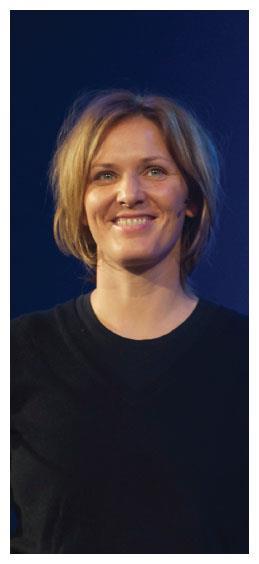
Danielle Strickland is a social justice campaigner, a popular speaker at events around the world , and a Salvation Army officer. Helen Crawford caught up with her at the recent Youthwork the conference event in Eastbourne.We know you’re busy as a speaker and writer, but what’s your day job? We [my husband and I] are officers in the Salvation Army and were reposted after three years in Australia to a church plant in Edmonton, Canada. It’s among a poor community where 40% of the congregation are indigenous Canadians and a lot of people are in recovery of some kind. We do some social action stuff too; a daily drop-in centre and a soup line. It’s kinda fun. Social action is very much at the heart of the Salvation Army – how has that passion come about in your personal journey, and how do you fight compassion fatigue? If you journey with Jesus long enough, everything goes back to justice. His mission statement is good news to the poor. I think if you take discipleship and the Bible seriously, everyone has to go there eventually; it’s where the road goes. I never set out on that route on purpose, I just followed Jesus and that’s where I ended up. I’d say the same thing about compassion fatigue. Every rigorous, totally surrendered person who did anything good in the world spent a considerable time with Jesus regularly, like John Wesley’s two hours of prayer every morning before he started his day. There aren’t very good many examples of people who just went out and did service work without proper time with Jesus and I think most people you find who are burnt out would be the examples where that is the case. Youth work has a high burnout rate. What can we do to address that trend? It’s about establishing a healthy spiritual rhythm and a lot less about balancing things. It’s about not thinking that there’s a utopian state that we get to where everything’s healthy and perfect but about intentionally making time with God in your life. It’s about saying no to cultural norms, like the amount of time we spend entertaining ourselves in the hopes of filling our lives. We have to do a fair bit of exposing of the lies we believe and literally surrender – we actually have to die to ourselves in order to live for Christ. There is pain in the offering; we don’t want there to be, and I don’t know why we believe the glossy magazine cover that the perfect youth worker has whitened teeth and shiny hair and is married to the perfect guy. That’s just pretend. Most saints were ugly, and had painful lives, and had deep joy of the Holy Spirit. Your new book, The Liberating Truth: How Jesus Empowers Women is out soon. Tell us about the journey behind that. I’ve become more and more aware that if you take any injustice in the world and look at the root cause of it, gender discrimination plays a huge part. Women are still the most persecuted group in the world; there’s a lot of oppression. At the same time, we make it a church issue. In the Western world we have women leaders - which the church was a big part of bringing into being - but now in some churches there’s a new wave that’s anti-women. It’s quite unhealthy, and unhelpful for the mission of the church and the plight of women in the world. After speaking at different places I was having conversations with lots of women who had questions. They were basing their future on who they would marry rather than who they were meant to be, and making really poor decisions based on a misunderstanding of Scripture. I decided to write a book, hoping to equip women to lead in the way they’re gifted and to do what God tells them to do. Hopefully it will challenge existing structures of church that resist that. From that, we can free bunch of women who suffer absolute persecution and violence, and to say, ‘We’re with you.’ How do being a mother and being a leader impact one other? Any parent would tell you that your learning curve of who God is really increases. I think being a mother has only enriched my ability to lead and my ability to connect with God. Both my sons are a blessing to the Lord and they come with us. My husband and I both lead together in our denomination so there’s a lot of flexibility. It’s a bit chaotic; we’re messy but loving Jesus and wanting to follow him, so we just do what’s in front of us. You’ve said that the Salvation Army is the ‘fist of the church’. How do you think the different denominations fit together? Each denomination is like a colour. Red doesn’t have to apologise for being red; we love red. And yellow doesn’t have to apologise for not being red, because we love yellow. You can even mix the colours and they become more vibrant and beautiful. I think denomination is like colour in the body of Christ, and we need to celebrate our colour. I think denominations have sometimes become really apologetic about who they are. As a result we have a muted version of the body of Christ: we’re all going for vanilla – but we don’t need vanilla. We need vibrancy. I think true unity is a celebration of diversity. There’s a freedom in that. Helen Crawford is the Deputy Editor of Youthwork magazine




























